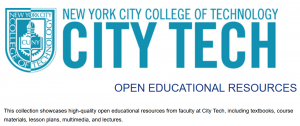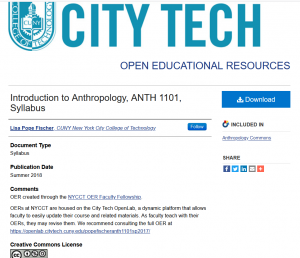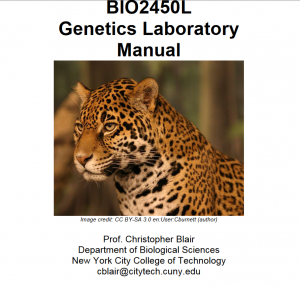Now that you’ve converted your course to zero-cost O.E.R., make sure to designate it with the Zero Textbook Cost (ZTC) attribute!
- The ZTC attribute is coded and visible to students in the CUNYFirst Schedule of Classes the same way that Interdisciplinary, and Writing-Intensive courses are coded.
- This ZTC attribute can be used for any course with no required textbook purchase.
- Designating your course ZTC helps CUNY’s O.E.R. grant reporting efforts, which in turn helps City Tech continue to receive state funds for our O.E.R. initiatives.
Designating ZTC with CourseDog:
- For Departments: Department schedulers, please email the list of ZTC sections to the Registrar (MCF@citytech.cuny.edu) and they will add the ZTC attribute.
- For MCF (Master Course File): Other Settings -> Attributes -> OERS – OERS (ZERO Textbook Cost).
For Faculty: When to Designate a Course Section with the “ZERO Textbook Cost” (ZTC/OER) Attribute:
- ZTC/OER course sections are those that do not require students to purchase a textbook.
- ZTC/OER designated course sections may include recommended books, library materials, or materials provided at no cost by the instructor. Students may be asked to print out materials, if the materials are provided free of charge.
- ZTC/OER designated courses need only be free of cost for textbooks. ZERO designated courses may include costs for supplies, a homework system, or a platform for hosting materials (provided it is relatively low cost).
- Any course section meeting this criterion and listed in the CUNYfirst schedule of classes is eligible. This includes Fully Online, Hybrid, In Person, Online, Partially Online, and Web-Enhanced.
- Course sections (classes) are assigned the ZTC/OER attribute independently. Courses may have ZTC\OER designated sections as well as non-ZTC-designated sections, depending on the materials chosen by each section’s instructor.
- Courses that consist of linked sections (e.g., lecture + labs) may have the ZTC/OER designation applied to whichever sections do not require purchase of a book. A course may have a ZTC/OER designated lab section, but require a textbook for the lecture section, for example.
Deadlines:
- To ensure that designations are in place in time for students to consider course costs, please designate your course as ZTC/OER within two weeks of the call for book orders.
- If you miss this deadline, please retroactively code prior courses so that they are counted in CUNY OAA’s end-of-year O.E.R. reporting to New York State.
Discovering Zero Textbook Cost (ZTC) courses in CUNYFirst:
The ZTC attribute helps students understand which courses do not require them to purchase a textbook when scheduling their classes.
Students can search for these courses in the CUNYFirst Schedule of Classes by selecting the Zero Textbook Cost (ZTC) course attribute. Refer to the below image for details:
Post credits: This post was adapted from “Open Educational Resources (OERs) @ Hostos: Get a ZTC designation” by Linda Miles, licensed under a Creative Commons Attribution-NonCommercial-ShareAlike 4.0 International License.






